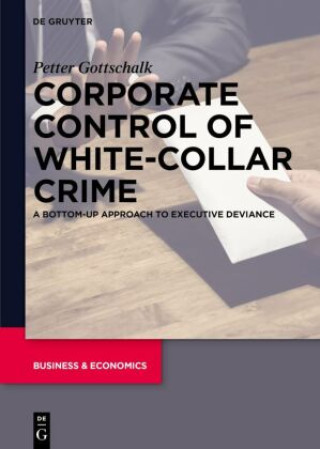
Kód: 45723989
Corporate Control of White-Collar Crime
Autor Petter Gottschalk
Traditionally, corporate control is all about top-down approaches to management of employees. Executives attempt to influence employees toward achieving business goals, and they attempt to prevent and detect wrongdoing, misconduct ... celý popis
- Jazyk:
 Angličtina
Angličtina - Vazba: Brožovaná
- Počet stran: 225
Nakladatelství: De Gruyter, 2024
- Více informací o knize

523 Kč
Dostupnost:
50 % šance Máme informaci, že by titul mohl být dostupný. Na základě vaší objednávky se ho pokusíme do 6 týdnů zajistit.
Máme informaci, že by titul mohl být dostupný. Na základě vaší objednávky se ho pokusíme do 6 týdnů zajistit.Prohledáme celý svět
Mohlo by se vám také líbit
-

Berserk Deluxe Volume 1
1033 Kč -

Haunting Adeline
617 Kč -

Berserk Deluxe Volume 3
1138 Kč -

Berserk Deluxe Volume 2
1056 Kč -

LEGO Star Wars Visual Dictionary Updated Edition
545 Kč -

Atomic Habits
340 Kč -

Harry Potter and the Prisoner of Azkaban (Minalima Edition)
978 Kč -

Powerless
276 Kč -

Chainsaw Man, Vol. 15
251 Kč -

House of Leaves
541 Kč -

Berserk Deluxe Volume 5
1115 Kč -

Hunting Adeline
633 Kč -

White Nights
90 Kč -

Iron Flame
353 Kč -

Cry Baby Coloring Book
270 Kč -

The Official Stardew Valley Cookbook
659 Kč -

JUJUTSU KAISEN V22
241 Kč -

Gravity Falls Journal 3
430 Kč -

Twisted Lies
276 Kč -

Berserk Deluxe Volume 4
1165 Kč -

Heaven Official's Blessing: Tian Guan Ci Fu (Novel) Vol. 2
442 Kč
Dárkový poukaz: Radost zaručena
- Darujte poukaz v libovolné hodnotě a my se postaráme o zbytek.
- Poukaz se vztahuje na celou naši nabídku.
- Elektronický poukaz vytisknete z e-mailu a můžete ihned darovat.
- Platnost poukazu je 12 měsíců od data vystavení.
Informovat o naskladnění knihy
Zadejte do formuláře e-mailovou adresu a jakmile knihu naskladníme, zašleme vám o tom zprávu. Pohlídáme vše za vás.
Více informací o knize Corporate Control of White-Collar Crime
Nákupem získáte 52 bodů
 Anotace knihy
Anotace knihy
Traditionally, corporate control is all about top-down approaches to management of employees. Executives attempt to influence employees toward achieving business goals, and they attempt to prevent and detect wrongdoing, misconduct, and crime among employees. However, top-down approaches to corporate control do not work when executives and other privileged individuals in the business themselves commit and conceal their wrongdoing, misconduct, and crime in organizational settings. Then there is a need for a bottom-up approach in corporate control as outlined in this book. Bottom-up control refers to the manner in which organizational members can use different types of control mechanisms - such as whistleblowing, transparency, resource access, or culture - to monitor, measure, and evaluate executives' avoidance of deviant behaviors and influence them toward achieving the organization's goals in efficient and effective ways. The newly emerging perspective of a social license to operate forms part of the bottom-up strategy where criminalization becomes social property independent of the criminal justice system. The social license is predominantly centered on social permission for business activity where the media, social movements, and citizen watchdogs exert pressure, demand change, and bring top management to account. This book presents a novel approach to corporate control of white-collar crime based on the theory of convenience. White-collar crime is financial crime committed by privileged individuals who have legitimate access to resources based on the power and trust inherent through their professional positions. Convenience theory proposes that motive, opportunity, and willingness are the three dimensions that underlie white-collar crime in an organizational context. This book contributes to the study of white-collar criminality through a blend of theoretical discussions and practical materials that illuminate and support the use of convenience theory. The book discusses how bottom-up approaches can overcome the difficulty of detecting white-collar crime and overcome the barriers of preventing executive deviance.
 Parametry knihy
Parametry knihy
Zařazení knihy Knihy v angličtině Society & social sciences Social services & welfare, criminology Crime & criminology
523 Kč
- Plný název: Corporate Control of White-Collar Crime
- Podnázev: A Bottom-Up Approach to Executive Deviance
- Autor: Petter Gottschalk
- Jazyk:
 Angličtina
Angličtina - Vazba: Brožovaná
- Počet stran: 225
- EAN: 9783111536781
- ID: 45723989
- Nakladatelství: De Gruyter
- Rozměry: 240 × 170 mm
- Datum vydání: 21. August 2024
Osobní odběr Praha, Brno a 12903 dalších
Copyright ©2008-24 nejlevnejsi-knihy.cz Všechna práva vyhrazenaSoukromíCookies


 Vrácení do měsíce
Vrácení do měsíce 571 999 099 (8-15.30h)
571 999 099 (8-15.30h)